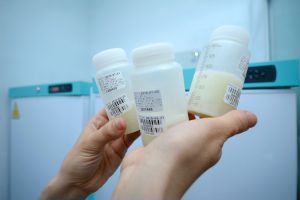
Infants born extremely prematurely require fortification to supplement breast milk. But does it make a difference to the risk of serious complications in premature babies whether the fortification comes from breast milk or cow’s milk? This was investigated in a large clinical trial led in Linköping, Sweden.
Fortified Breast Milk for Extremely Premature Births
Babies born extremely prematurely between 22 and 27 weeks of pregnancy are among the most vulnerable healthcare patients. The risk of serious complications is very high. Almost one in four babies who are born significantly prematurely die before the first year of life. There is research about giving these children breast milk instead of cow’s milk formula. The cow’s milk-based formula is known to increase the risk of developing, for example, severe intestinal inflammation and sepsis (serious blood-borne infections).
In Sweden, all extremely premature babies receive breast milk from the mother or donated breast milk. Nevertheless, almost one in ten children suffers from severe intestinal inflammation, the so-called necrotizing enterocolitis. This is one of the worst diseases you can have. Three out of ten children die and those who survive often have neurological problems afterwards. Historically, there have been very few studies in extremely premature babies comparing treatments.
Therefore, there is a great need for clinical trials that can provide scientific evidence on how these children should be treated to have a better chance of survival and a good life. In some countries, such as Sweden, infants are fed exclusively with breast milk or donated breast milk. However, in order for extremely premature births to grow as well as possible, they need more nutrition than their mother’s milk contains. That’s why additional protein is added to breast milk, the so-called enrichment. The fortification was previously made from cow’s milk. However, there is suspicion that fortification with cow’s milk increases the risk of serious complications.
Fortification From Breast Milk or Cow’s Milk
Today, there is fortification based on donated breast milk that is already being used in healthcare settings in some places. The big question is whether it can reduce the risk of disease in extremely premature babies. The study, called N-Forte (the Nordic Study of Breast Milk Fortification in Extremely Preterm Infants), is the largest ever conducted to find answers to this question. The results were eagerly awaited by pediatricians and other groups caring for these fragile infants. The researchers concluded that it does not matter whether extremely premature infants receive fortification from cow’s milk or donated breast milk. Although the study suggests there was no difference between the two options, its results could be useful. The breast milk-based product is estimated to cost more than SEK 100,000 per child, which would equate to around SEK 40 million if the product were used in Swedish healthcare.
The N-Forte study included 228 extremely premature infants who were randomly divided into two equal groups and received fortification from breast milk or cow’s milk. The researchers examined whether the two groups differed in the incidence of necrotizing enterocolitis, sepsis and death. Of the children treated with breast milk-based fortification, 35.7% had these complications, while the corresponding proportion in the group receiving cow’s milk-based fortification was 34.5%, meaning there was no difference between the groups. The study’s results are consistent with a smaller study from Canada published in 2018. In this study, researchers also found no difference between the two types of enhancement in necrotizing enterocolitis and severe sepsis.
Lactic Acid Bacteria for Premature Babies

Extremely premature babies can suffer from life-threatening intestinal inflammation. A clinical study has shown that lactic acid bacteria supplements can have beneficial effects by increasing the diversity of gut bacteria in these infants. The study was led by researchers at Linköping University, Sweden, and published in the journal Cell Reports Medicine. One liter of milk weighs one kilogram. Most infants born extremely prematurely weigh less. An infant who should have had three more months to develop and grow in the protective environment of the womb is of course extremely vulnerable. Because of advances in newborn care, many premature babies survive, although one in four extremely premature babies die.
Premature babies can be affected by very severe intestinal inflammation, which occurs almost exclusively in such infants. The disease, necrotizing enterocolitis (NEC), causes parts of the intestine to die. One in three infants who contract the infection die. And those who survive often suffer from long-term complications such as short bowel syndrome and neurodevelopmental disorders.
Probiotics Against Severe Intestinal Inflammation
The bacteria in the intestines of premature babies are different from those of full-term babies. This has led many people to investigate whether giving probiotic supplements containing certain bacteria has a positive effect. One finding is that the lactic acid bacterium Lactobacillus reuteri can reduce the risk of NEC in premature babies. However, it is not clear whether this also applies to extremely premature babies, nor is the mechanism behind the positive effect known.
The researchers examined 132 infants who were born extremely prematurely between weeks 23 and 28 of pregnancy, i.e. 17 to 12 weeks before their due date. All weighed less than one kilogram at birth. Each infant was randomly assigned to one of two groups: they received oil drops containing the probiotic or a placebo. Treatment was given daily during the newborn period. The scientists examined how the intestinal bacterial flora was affected by the addition of L. reuteri and analyzed bacteria in the stool at several times.
They found that the composition of bacteria in the gut differed in the first month of probiotic treatment. In the first week of life, the bacteria groups Staphylococcus and Klebsiella, which can cause disease, were more common in the group that received placebo. Klebsiella can cause inflammation and has been linked to NEC and sepsis. The present study does not allow conclusions to be drawn as to whether probiotic treatment influences the risk of these diseases in these extremely premature infants. Larger studies are required to determine this. Probiotic supplementation is being used in more and more neonatal clinics. The scientific evidence that probiotic supplementation has a positive effect in premature babies and can be used safely is considered sufficiently strong. Nevertheless, further investigations are important.


